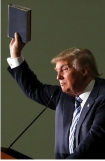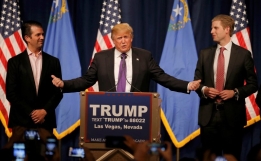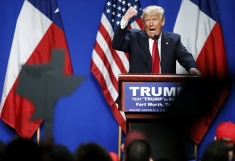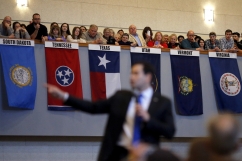Front-runner Donald Trump is in position to take firm control of the Republican presidential race when 11 states vote on Tuesday, an outcome likely to intensify concerns among party leaders that the brash billionaire has hijacked the party.
In the Democratic race, former Secretary of State Hillary Clinton can go a long way toward silencing concerns about her candidacy with big victories of her own over democratic socialist Bernie Sanders on Super Tuesday.
Trump was leading in nearly all the states that will hold primary contests or caucuses, most of them in the American South. The lone exception appeared to be Texas, where US Senator Ted Cruz, who represents that state, enjoyed a narrow lead and was in desperate need of a victory.
Super Tuesday is the biggest single day of state-by-state presidential nominating contests for the Nov. 8 election to succeed Democratic President Barack Obama.
Trump, a New York real estate developer and former reality TV star, has defied all expectations with campaign pledges to build a wall along the US southern border with Mexico and deport 11 million illegal immigrants.
With a string of victories on Tuesday, he would advance toward sealing the nomination against opposition from Cruz, US Senator Marco Rubio of Florida, Ohio Governor John Kasich and retired neurosurgeon Ben Carson.
On the eve of voting, Cruz and Rubio called on Trump to ask the New York Times to release an audiotape of an interview he gave to the newspaper's editorial board on January 5, which they believe will show Trump does not back his own immigration policy. The Trump campaign had no immediate response.
Republican unease
The notion of a Trump victory has alarmed Republican Party leaders, many of whom do not support his positions and who feel that Clinton would easily defeat him in November.
Adding to their unease was Trump's reluctance in a CNN interview on Sunday to disavow an endorsement of him by David Duke, a former grand wizard of the Ku Klux Klan, a white supremacist group.
On NBC's "Today" show on Monday, Trump blamed a faulty TV earpiece for his failure to do so, saying: "You could hardly hear what he (the interviewer) was saying."
The 2012 Republican presidential nominee, Mitt Romney, was not convinced of Trump's sincerity.
"A disqualifying & disgusting response by @realDonaldTrump to the KKK. His coddling of repugnant bigotry is not in the character of America," Romney tweeted.
The crossfire between Trump and establishment Republicans threatens to rip the party apart at a time when it will need to generate momentum behind a prospective nominee, a prospect that concerns some Republican strategists looking ahead to the nominating convention in July.
"If Trump continues winning, disappointed party elites will need to reconcile with supporting the party nominee. Ultimately, the party has always rallied come convention time, and that will be a healing moment moving forward," said Tim Albrecht, a Republican strategist in Iowa.
Rubio saw his support increase among Republican voters after a strong debate performance last week, rising to 20 percent from 14 percent, a Reuters-Ipsos poll found. Trump still dominated the field with 42 percent support.
Clinton leads in South
On the Democratic side, polls show Clinton, who has won three of the first four Democratic contests, with a big lead in six Southern states that have large blocs of black voters, who have been slow to warm to Sanders, a US senator from Vermont.
Sanders has been aiming for wins in five other states on Tuesday - Vermont, neighboring Massachusetts, Oklahoma, Minnesota and Colorado.
One factor helping Clinton is a focus on getting her voters to make their choices early. More than half the delegates needed to secure the Democratic nomination will be chosen in March with contests in 28 states, and more than a third of those have early voting.
On a recent afternoon in a municipal building in downtown Augusta, Georgia, voters popped in to cast early ballots, such as Zekia Brunson, 33.
"I believe that Bernie Sanders would do a good job, but I believe more in Clinton," Brunson said.

















